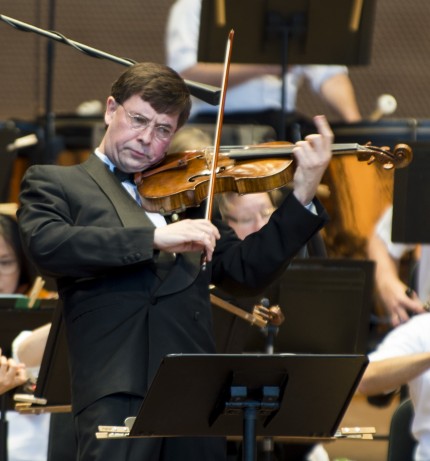Diaz provides sterling advocacy in belated Walton premiere at Grant Park

In eight decades of adventurous programming, there are not many works by well-regarded composers that have not been heard at the Grant Park Music Festival. But Wednesday’s concert by the Grant Park Orchestra served up a neglected gem with the festival premiere of William Walton’s Viola Concerto.
There was a bittersweet timing to the performance, played by Roberto Diaz, president of the Curtis Institute of Music in Philadelphia. Diaz served for a decade as principal viola of the Philadelphia Orchestra, and, on Monday his celebrated teacher and Philadelphia Orchestra predecessor Joseph de Pasquale died at age 95.
De Pasquale taught at Curtis for many decades, served as principal viola in the Boston Symphony Orchestra as well as in Philadelphia, and premiered many important American works, including Walter Piston’s Viola Concerto and George Rochberg’s Viola Sonata.
Written in 1929, Walton’s Viola Concerto was one of the first works to gain the English composer international acclaim. Premiered by Paul Hindemith and substantially revised in 1962, the concerto remains one of Walton’s most attractive and engaging works, skillfully balancing an almost Elgarian vein of reflective introspection with a bristling energy that pre-echoes his astringent Symphony No. 1, which would come three years later. Perhaps the concerto’s quiet coda accounts in part for its undeserved neglect.
Diaz is not the most demonstrative of soloists, yet for all his businesslike stage demeanor, his playing fully plumbed the score’s expressive potential. Performing on his ex-Primrose Amati, Diaz brought silken tone and a dark burnished beauty to the opening theme, switching gears for the animated toccata-like section, and weaving gentle arabesques over the movement’s closing reprise of the theme by oboe and flute. The syncopated energy of the central movement was handled with understated virtuosity by Diaz, with close accompaniment by Kalmar and the orchestra.
The final movement is as long as the first two sections together and here Diaz’s performance was especially inspired. The soloist handled the sardonic Prokofiev-like motif with unruffled assurance and easy articulation. Yet it was in the pages of expansive lyricism that Diaz’s playing really shone, rendered with a singing tone and finely calibrated vibrato that was sweetly expressive without ever turning sentimental. His sensitive playing of the hushed final bars was magical with Kalmar and the Grant Park musicians providing equally refined support.
Might we have Diaz back to perform the Piston Viola Concerto? That beautiful work is overdue for a local hearing and aligns nicely with the lakefront festival’s advocacy of American music.
The rude brass blat on the first chord of the fate motif that opens Tchaikovsky’s Symphony No. 4 didn’t bode well. But after a few unfocused minutes, Kalmar got the Grant Park musicians back on track, and the performance found its footing. Kalmer led a sturdy reading, with strong dramatic cut in the stormy opening movement, the contrasting second theme drawn out in measured fashion yet well sustained by the conductor.
Conversely, the Andantino felt a bit impatient and lacking in requisite languor, though nocturnal atmosphere was provided by the characterful woodwinds. The pizzicato Scherzo went with alert dynamic marking and pinpoint timing.
The frantic energy of the finale had a driven desperation under Kalmar that made it feel as hollow as the closing of Shostakovich’s Fifth. That actually seems like a more convincing way to handle the movement, which still delivered plenty of excitement, spiced by the conductor’s burst of acceleration at the coda.
The weather cooperated on another overcast night, with the evening’s rain not falling until seconds after the symphony ended.
Carlos Kalmar leads the Grant Park Orchestra in James MacMillan’s Quickening, Mendelssohn’s Symphony No. 5 “Reformation,” and the Prelude to Act 1 of Wagner’s Parsifal 6:30 p.m. Friday and 7:30 p.m. Saturday at the Pritzker Pavilion. gpmf.org.
Posted in Performances



Posted Jun 25, 2015 at 7:18 pm by Laurie
Perhaps the “rude brass blat” could have been avoided if the maestro had checked to make sure that all of the players were ready before he jumped and gave the downbeat.